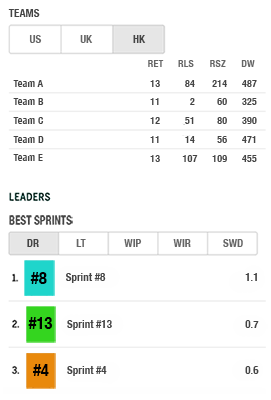
Batting average, runs, home runs, runs batted in, stolen bases, on-base slugging, earned run average, strikeouts, etc, etc. There are literally hundreds of statistics that surround baseball. Everything is measured. Keeping such records dates back to the 19th Century, but has stepped up a gear since the development of Sabermetrics from the 1960s, and made famous by Michael Lewis’ Moneyball.
The reason I’m bringing this up is that I’ve heard two interesting talks this year about measuring performance (from Linda Rising and David Anderson) and have been toying with what stats we could look at in our industry. I’m a baseball fan and wondered if we could do something similar to what baseball does? None of baseball’s stats can be looked at in isolation, but if we reported on a number of aspects, could that give us an insight as to the general health of a team and, if we aggregated various stats, would it reveal the attitude of an organisation?
For example, would the number of retrospectives held tell us much? A low number would tell us that they didn’t happening (although a high number wouldn’t tell us much about quality). Would reporting on the number of stories per release be meaningful? Maybe it would if we also knew the number of releases?
You could have some team-based stats:
- RET: Retrospective in the last 3 months
- RLS: Number of releases in the last 3 months
- AWR: Average number of work items per release
- DW: Days Worked (i.e. the total number of days that team members worked)
You could have some product based:
- AV: Average number of visits per month (over the last 3 months)
- AS: Average number of sales per month (over the last 3 months)
- SPV: Sales per visit (i.e. AS / AV)
You could then have some calculations using both team and sales stats:
- SWD: Sales and work days = Sales divided by days worked (AS / DW)
- RSZ: Release size = Number of releases in last 3 months (RLS) releases x Average number of work items per release (AWR)
Maybe you’d need to pick stats that were affected by the work your team does: if your work doesn’t impact customer sales, then is that a useful metric to report on? It might still affect how you approach work items. Maybe you would want to report on the number of times your API is consumed or the number of entries made to your database.
Okay, so I’m not seriously suggesting we do this but, before we disregard all measurements as folly, we should remember that Sabermetrics was disregarded initially: the wise old scouts dismissed the statistics as rubbish because they knew what made a good baseball player. For example, they said a good hitter was one that could steal bases (i.e. a runner advancing from one base to another while the pitcher is throwing the ball at the batter) because stealing bases won games. But, Sabermetrics showed that getting batters on base (by any method) won games. Moneyball is a beautifully uplifting book about how a poor team (the Oakland Athletics) starting beating the wealthy teams by buying unfashionable (cheap) players that Sabermetrics rated as high, but the experts wouldn’t touch.
So although we might not go to the lengths I toyed with above, maybe it’s time that we starting measuring performance more and trying to see what aspects really do lead to better performance?
